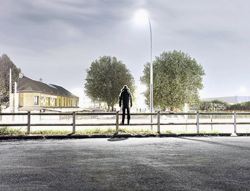
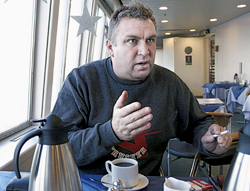
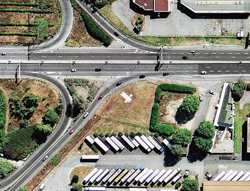
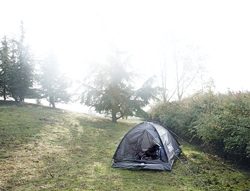
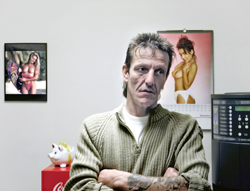
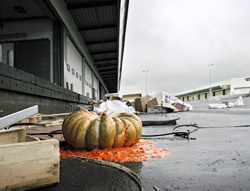
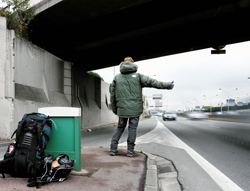
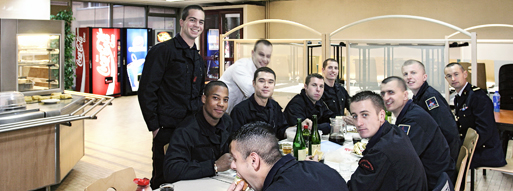
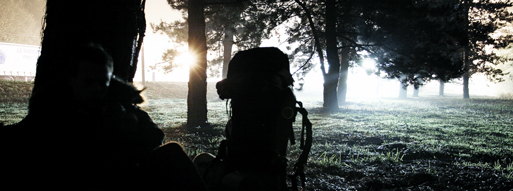
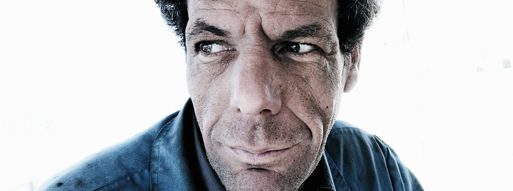
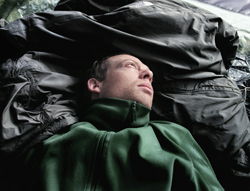
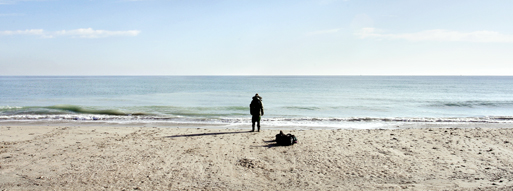
Day 1. Koege, Denmark, 6.45 am.
Day 2. Paris, 7.30 pm.
Day 2. Paris, 8.20 pm.
Day 3. Paris, 10.10 am.
Day 3. Paris, 10.05 pm.
Day 4. Paris, 3.31 pm.
Day 5. Fontainebleau National Forest, 11.45 pm.
Day 6. Lyon, 8.20 pm.
Day 7. Lyon, 1.00 pm.
Day 8. Palavas, 11 am.
Equipped with a camera, a pen, a notebook, and a few items such as my iPod, a tent, and a couple of pots, in the winter 2004 I set out to travel the 1700 kilometers from Copenhagen to the Mediterranean Sea. I wanted to know if I could cover the distance with just 14 euro in my pocket.
A minute ago I said goodbye to my friend, Peter, who got up at six o’clock this morning to drive me from the centre of Copenhagen to the truck stop in Koege where I am now. It’s up to me now to get from here to the Mediterranean Sea with only 14 euro to spend. It shouldn’t be too difficult.
I can understand why homeless people become alcoholics. I’m sitting in a parking lot close to an expressway on the outskirts of Paris. It’s four degrees Celsius, and I haven’t got a home until I find a place to put up my tent. I just smoked a cigarette, and don’t understand why it made me feel dizzy. But it did. And it felt good - for one second or three to escape the traffic noise from the expressway and like a drunk man enjoy the buzz and forget to remember to be worried. When you’re drunk, you’re not bored, and it has got to be extremely boring to be homeless. No information, no concrete knowledge, and therefore no enthusiasm for anything – except perhaps for the sensation of being drunk.
Half an hour ago I bought a baguette with pâté in a butcher’s shop in the parking lot. The shop is closed now, and Mr. and Mrs. butcher have just left in their refrigerated car. I paid four euro for the baguette and the pâté - the first money I’ve spent on the trip. Yesterday morning I met Klaus Sperling, a 47-year old German truck driver who gave me a lift from the truck stop in Koege in Denmark to a freight terminal in Lübeck in Germany. He paid for my ticket for the Roedby/Puttgarden ferry, and in the restaurant on the ferry he asked me to choose from the menu what I wanted. He said, “Maybe we’ll meet again in a few years’ time. Then perhaps you can help me”.
I want to find a bathroom and get a shower in the freight terminal where I was dropped off today. The terminal is 100 meters from here, on the other side of the expressway. I doubt that I’ll succeed.
I can understand why homeless people become alcoholics. I’m sitting in a parking lot close to an expressway on the outskirts of Paris. It’s four degrees Celsius, and I haven’t got a home until I find a place to put up my tent. I just smoked a cigarette, and don’t understand why it made me feel dizzy. But it did. And it felt good - for one second or three to escape the traffic noise from the expressway and like a drunk man enjoy the buzz and forget to remember to be worried. When you’re drunk, you’re not bored, and it has got to be extremely boring to be homeless. No information, no concrete knowledge, and therefore no enthusiasm for anything – except perhaps for the sensation of being drunk.
Half an hour ago I bought a baguette with pâté in a butcher’s shop in the parking lot. The shop is closed now, and Mr. and Mrs. butcher have just left in their refrigerated car. I paid four euro for the baguette and the pâté - the first money I’ve spent on the trip. Yesterday morning I met Klaus Sperling, a 47-year old German truck driver who gave me a lift from the truck stop in Koege in Denmark to a freight terminal in Lübeck in Germany. He paid for my ticket for the Roedby/Puttgarden ferry, and in the restaurant on the ferry he asked me to choose from the menu what I wanted. He said, “Maybe we’ll meet again in a few years’ time. Then perhaps you can help me”.
I want to find a bathroom and get a shower in the freight terminal where I was dropped off today. The terminal is 100 meters from here, on the other side of the expressway. I doubt that I’ll succeed.
I haven’t written my diary from the time I left Denmark yesterday morning until a couple of hours ago this evening. The reason is that nothing on the trip from Copenhagen to the suburb in Paris where I am now has really made
an impression on me.
I got a ride with three different truck drivers, but being with them didn’t touch me significantly. Had I been underway for a week when I met them, perhaps they would have – touched me, that is. And this is the reason I felt no urge to write about them:
The nine o’clock news and the belief nourished by Danish media that Denmark is the only country in the world, narrow rather than expand my lust for life.
This fact was still so much a part of me at the beginning of the trip that I wasn’t able to embrace the three truck drivers with mentally open arms.
It takes a couple of days for the feeling of freedom to settle in, and until they have passed I’ll remain handcuffed by the pattern that my life in Denmark follows.
Fuck it. I’ve got to find a place to sleep.
I’ve just woken up. My legs are in the sleeping bag. I slept with my ski-jacket on. Wearing woolen underwear. And a thermo jacket under the ski-jacket and a wife-beater and t-shirt and turtleneck under the thermo jacket. Even so, I was freezing last night. The tent is a one-man tent I brought with me from the Tuborg-camp at Roskilde Music Festival this year. When opening the tent bag yesterday evening, I realized that it contained neither pegs nor a rain fly. Last night it was raining. And the air inside the tent was no warmer than that outside. It was three degrees Celsius last night.
The tent is put up in a triangular island of 100 square meters surrounded by three noisy expressways. I had to stride over two crash barriers to get here. The orange sodium lamps that illuminate the three expressways lit up my tent all night, and yesterday evening they cast the silhouette of a rat with a long tail on the canvas. I slammed my hand against the canvas to scare it away, but it didn’t react. So I pulled the fur cap of my ski jacket over my head and kept the rustling noise away with the sound of Charles Bukowski’s drawling voice on a CD recorded during one of his spoken word performances.
The alarm of my cell phone just sounded. In 35 minutes, at 11 o’clock, I shall call Momo – a Spanish truck driver my age, whom I met yesterday evening at the freight terminal. Momo will be driving to Spain today and will – according to what he promised me yesterday evening – take me with him. He’ll be leaving around 11 o’clock.
I’ve just woken up. My legs are in the sleeping bag. I slept with my ski-jacket on. Wearing woolen underwear. And a thermo jacket under the ski-jacket and a wife-beater and t-shirt and turtleneck under the thermo jacket. Even so, I was freezing last night. The tent is a one-man tent I brought with me from the Tuborg-camp at Roskilde Music Festival this year. When opening the tent bag yesterday evening, I realized that it contained neither pegs nor a rain fly. Last night it was raining. And the air inside the tent was no warmer than that outside. It was three degrees Celsius last night.
The tent is put up in a triangular island of 100 square meters surrounded by three noisy expressways. I had to stride over two crash barriers to get here. The orange sodium lamps that illuminate the three expressways lit up my tent all night, and yesterday evening they cast the silhouette of a rat with a long tail on the canvas. I slammed my hand against the canvas to scare it away, but it didn’t react. So I pulled the fur cap of my ski jacket over my head and kept the rustling noise away with the sound of Charles Bukowski’s drawling voice on a CD recorded during one of his spoken word performances.
The alarm of my cell phone just sounded. In 35 minutes, at 11 o’clock, I shall call Momo – a Spanish truck driver my age, whom I met yesterday evening at the freight terminal. Momo will be driving to Spain today and will – according to what he promised me yesterday evening – take me with him. He’ll be leaving around 11 o’clock.
“Hey Simon where are you please call me Bernd”. My cell phone has been switched off for 12 hours, and only now have I turned it on, at 10.05 pm. The SMS is from Bernd, a German truck driver who gave me a lift from Lübeck to Hamburg. I wonder what he wants from me. Will he be able to help me get out of the situation I’m in now? I’m in my tent, this evening I put it up in the same place as yesterday evening. Before I called Momo at 10.55 this morning I was hoping that he’d take me with him to Spain. He picked up the phone, and from the conversation that followed I understood that he was close to the Belgian/French border and that I’d have to find another driver if I wanted to go south. I still haven’t found one.
I’ve lost my money. I’ve lost ten of the 14 euro I brought with me on this trip. I found out this evening. It surprises me that I allow myself to be so careless. Now I’ve got zero euro to get from Paris to the Mediterranean Sea. It would have been a somewhat insignificant challenge if I were able to speak French. Because then I would’ve been able to argue my case. But I can’t. So how will I get food the next couple of days? I found an eggplant, a squash, four potatoes and a lemon on a street in the three square-kilometer freight terminal where I’ve spent the day trying to find a truck driver who would take me south. I boiled the potatoes on my primus. An hour ago I smoked my last cigarette. Bernd smokes. I’ll call him tomorrow.
“Hey Simon where are you please call me Bernd”. My cell phone has been switched off for 12 hours, and only now have I turned it on, at 10.05 pm. The SMS is from Bernd, a German truck driver who gave me a lift from Lübeck to Hamburg. I wonder what he wants from me. Will he be able to help me get out of the situation I’m in now? I’m in my tent, this evening I put it up in the same place as yesterday evening. Before I called Momo at 10.55 this morning I was hoping that he’d take me with him to Spain. He picked up the phone, and from the conversation that followed I understood that he was close to the Belgian/French border and that I’d have to find another driver if I wanted to go south. I still haven’t found one.
I’ve lost my money. I’ve lost ten of the 14 euro I brought with me on this trip. I found out this evening. It surprises me that I allow myself to be so careless. Now I’ve got zero euro to get from Paris to the Mediterranean Sea. It would have been a somewhat insignificant challenge if I were able to speak French. Because then I would’ve been able to argue my case. But I can’t. So how will I get food the next couple of days? I found an eggplant, a squash, four potatoes and a lemon on a street in the three square-kilometer freight terminal where I’ve spent the day trying to find a truck driver who would take me south. I boiled the potatoes on my primus. An hour ago I smoked my last cigarette. Bernd smokes. I’ll call him tomorrow.
I’m sitting on a strip of grass on the outskirts of Paris next to a highway that leads to Lyon. It’s ten degrees Celsius and overcast, but inside me the sun is shining. Two hours ago I went down to a gas station at the highway near the freight terminal and started to hitchhike. 25 minutes later a fire truck full of young, French firemen pulled up next to me, and a boy in his mid-twenties rolled down the window. The boy spoke English. I asked him if they were heading south, and when he said no, I explained to him the situation I was in. I told him I was making a reportage for a Danish magazine about my trip from Copenhagen
to the Mediterranean Sea, and that I was doing the trip for 14 euro. I told him that the previous evening I’d lost ten of the 14 euro, and that now I had got no money and no cigarettes. “And I’m starving”, I told him. The boy had short, black hair and brown, friendly eyes. His name was Jean-Pierre. After exchanging some words with his colleagues in the truck, he got out and gave me a Marlboro cigarette and two euro. He said, “You want to eat with us if you can? Yes? We’re going to our house, ok, and if it’s possible someone come with a car in 20 minutes
and pick you up”.
Half an hour later I was eating a steak with green beans and half a pie in the canteen at the fire department. I told Jean-Pierre that I’d spent the last couple of days at the freight terminal looking for a truck driver who would take me south, and that the previous evening I’d eaten four potatoes I’d found on the ground at the terminal. Jean-Pierre translated what I told him to the eight firemen whose lively conversations had died as soon as I’d started to speak. Ten minutes later the chef – a 25-year old boy – came over to me and placed on the table before me a baguette and 15
small packages with cheese. “Some food for the trip”, he said. I resisted the urge to stand up and embrace him, but made
sure to let him know how happy I was to receive the food. One of the firemen – a black guy in his mid-twenties - drew with his hand a circle in the air above his head saying the word ‘douche’. Fifteen minutes later I was taking a shower in the bathroom that was part of the room Jean-Pierre shared with three of his colleagues. Stepping out of the shower I heard through the bathroom door the sound of a guitar and a voice singing. I opened the door and stood still in the doorframe. A French/Japanese boy was sitting on the bed singing and playing a French pop song while Jean-Pierre and two other boys were listening. When he realized that the Danish reporter was watching him, he quickly finished the tune
and handed me a yellow plastic bag lying on the bed next to him. It contained a can of tuna, biscuits, two small containers of orange juice, and a piece of cake wrapped in plastic.
Two more things are worth mentioning in connection with my rendez-vous with the firemen. 1: Before I left the fire department a guy whose name I didn’t get handed me a five-Euro note. According to Jean-Pierre he felt sympathy for my project and believed it would be impossible to get from Paris to the Mediterranean Sea without money. 2: When I got out of the minivan, in which a young fireman named Roman had taken me to the nearest approach road to the Lyon-highway, I asked him if by any chance I could have a cigarette. I felt ashamed to ask but I was dying for one. “Of course”, he said, pulling from his pocket a bag of tobacco containing a packet of Rizla rolling paper, and gave it to me. I hesitated, pretending I didn’t know what he was doing.
He said, “Come on, take it, I can just buy a new one”. I refused. He raised his voice. I gave in. And am now sitting on the grass next to the highway leading to Lyon. The temperature has fallen since I started writing this note. But the warm feelings I have for the ten boys from the fire department remain unchanged. I’ll smoke the last cigarette, and then I’ll start walking.
I’m sitting on a strip of grass on the outskirts of Paris next to a highway that leads to Lyon. It’s ten degrees Celsius and overcast, but inside me the sun is shining. Two hours ago I went down to a gas station at the highway near the freight terminal and started to hitchhike. 25 minutes later a fire truck full of young, French firemen pulled up next to me, and a boy in his mid-twenties rolled down the window. The boy spoke English. I asked him if they were heading south, and when he said no, I explained to him the situation I was in. I told him I was making a reportage for a Danish magazine about my trip from Copenhagen
to the Mediterranean Sea, and that I was doing the trip for 14 euro. I told him that the previous evening I’d lost ten of the 14 euro, and that now I had got no money and no cigarettes. “And I’m starving”, I told him. The boy had short, black hair and brown, friendly eyes. His name was Jean-Pierre. After exchanging some words with his colleagues in the truck, he got out and gave me a Marlboro cigarette and two euro. He said, “You want to eat with us if you can? Yes? We’re going to our house, ok, and if it’s possible someone come with a car in 20 minutes
and pick you up”.
Half an hour later I was eating a steak with green beans and half a pie in the canteen at the fire department. I told Jean-Pierre that I’d spent the last couple of days at the freight terminal looking for a truck driver who would take me south, and that the previous evening I’d eaten four potatoes I’d found on the ground at the terminal. Jean-Pierre translated what I told him to the eight firemen whose lively conversations had died as soon as I’d started to speak. Ten minutes later the chef – a 25-year old boy – came over to me and placed on the table before me a baguette and 15
small packages with cheese. “Some food for the trip”, he said. I resisted the urge to stand up and embrace him, but made
sure to let him know how happy I was to receive the food. One of the firemen – a black guy in his mid-twenties - drew with his hand a circle in the air above his head saying the word ‘douche’. Fifteen minutes later I was taking a shower in the bathroom that was part of the room Jean-Pierre shared with three of his colleagues. Stepping out of the shower I heard through the bathroom door the sound of a guitar and a voice singing. I opened the door and stood still in the doorframe. A French/Japanese boy was sitting on the bed singing and playing a French pop song while Jean-Pierre and two other boys were listening. When he realized that the Danish reporter was watching him, he quickly finished the tune
and handed me a yellow plastic bag lying on the bed next to him. It contained a can of tuna, biscuits, two small containers of orange juice, and a piece of cake wrapped in plastic.
Two more things are worth mentioning in connection with my rendez-vous with the firemen. 1: Before I left the fire department a guy whose name I didn’t get handed me a five-Euro note. According to Jean-Pierre he felt sympathy for my project and believed it would be impossible to get from Paris to the Mediterranean Sea without money. 2: When I got out of the minivan, in which a young fireman named Roman had taken me to the nearest approach road to the Lyon-highway, I asked him if by any chance I could have a cigarette. I felt ashamed to ask but I was dying for one. “Of course”, he said, pulling from his pocket a bag of tobacco containing a packet of Rizla rolling paper, and gave it to me. I hesitated, pretending I didn’t know what he was doing.
He said, “Come on, take it, I can just buy a new one”. I refused. He raised his voice. I gave in. And am now sitting on the grass next to the highway leading to Lyon. The temperature has fallen since I started writing this note. But the warm feelings I have for the ten boys from the fire department remain unchanged. I’ll smoke the last cigarette, and then I’ll start walking.
I’m sitting on a strip of grass on the outskirts of Paris next to a highway that leads to Lyon. It’s ten degrees Celsius and overcast, but inside me the sun is shining. Two hours ago I went down to a gas station at the highway near the freight terminal and started to hitchhike. 25 minutes later a fire truck full of young, French firemen pulled up next to me, and a boy in his mid-twenties rolled down the window. The boy spoke English. I asked him if they were heading south, and when he said no, I explained to him the situation I was in. I told him I was making a reportage for a Danish magazine about my trip from Copenhagen
to the Mediterranean Sea, and that I was doing the trip for 14 euro. I told him that the previous evening I’d lost ten of the 14 euro, and that now I had got no money and no cigarettes. “And I’m starving”, I told him. The boy had short, black hair and brown, friendly eyes. His name was Jean-Pierre. After exchanging some words with his colleagues in the truck, he got out and gave me a Marlboro cigarette and two euro. He said, “You want to eat with us if you can? Yes? We’re going to our house, ok, and if it’s possible someone come with a car in 20 minutes
and pick you up”.
Half an hour later I was eating a steak with green beans and half a pie in the canteen at the fire department. I told Jean-Pierre that I’d spent the last couple of days at the freight terminal looking for a truck driver who would take me south, and that the previous evening I’d eaten four potatoes I’d found on the ground at the terminal. Jean-Pierre translated what I told him to the eight firemen whose lively conversations had died as soon as I’d started to speak. Ten minutes later the chef – a 25-year old boy – came over to me and placed on the table before me a baguette and 15
small packages with cheese. “Some food for the trip”, he said. I resisted the urge to stand up and embrace him, but made
sure to let him know how happy I was to receive the food. One of the firemen – a black guy in his mid-twenties - drew with his hand a circle in the air above his head saying the word ‘douche’. Fifteen minutes later I was taking a shower in the bathroom that was part of the room Jean-Pierre shared with three of his colleagues. Stepping out of the shower I heard through the bathroom door the sound of a guitar and a voice singing. I opened the door and stood still in the doorframe. A French/Japanese boy was sitting on the bed singing and playing a French pop song while Jean-Pierre and two other boys were listening. When he realized that the Danish reporter was watching him, he quickly finished the tune
and handed me a yellow plastic bag lying on the bed next to him. It contained a can of tuna, biscuits, two small containers of orange juice, and a piece of cake wrapped in plastic.
Two more things are worth mentioning in connection with my rendez-vous with the firemen. 1: Before I left the fire department a guy whose name I didn’t get handed me a five-Euro note. According to Jean-Pierre he felt sympathy for my project and believed it would be impossible to get from Paris to the Mediterranean Sea without money. 2: When I got out of the minivan, in which a young fireman named Roman had taken me to the nearest approach road to the Lyon-highway, I asked him if by any chance I could have a cigarette. I felt ashamed to ask but I was dying for one. “Of course”, he said, pulling from his pocket a bag of tobacco containing a packet of Rizla rolling paper, and gave it to me. I hesitated, pretending I didn’t know what he was doing.
He said, “Come on, take it, I can just buy a new one”. I refused. He raised his voice. I gave in. And am now sitting on the grass next to the highway leading to Lyon. The temperature has fallen since I started writing this note. But the warm feelings I have for the ten boys from the fire department remain unchanged. I’ll smoke the last cigarette, and then I’ll start walking.
I’m sitting on a strip of grass on the outskirts of Paris next to a highway that leads to Lyon. It’s ten degrees Celsius and overcast, but inside me the sun is shining. Two hours ago I went down to a gas station at the highway near the freight terminal and started to hitchhike. 25 minutes later a fire truck full of young, French firemen pulled up next to me, and a boy in his mid-twenties rolled down the window. The boy spoke English. I asked him if they were heading south, and when he said no, I explained to him the situation I was in. I told him I was making a reportage for a Danish magazine about my trip from Copenhagen
to the Mediterranean Sea, and that I was doing the trip for 14 euro. I told him that the previous evening I’d lost ten of the 14 euro, and that now I had got no money and no cigarettes. “And I’m starving”, I told him. The boy had short, black hair and brown, friendly eyes. His name was Jean-Pierre. After exchanging some words with his colleagues in the truck, he got out and gave me a Marlboro cigarette and two euro. He said, “You want to eat with us if you can? Yes? We’re going to our house, ok, and if it’s possible someone come with a car in 20 minutes
and pick you up”.
Half an hour later I was eating a steak with green beans and half a pie in the canteen at the fire department. I told Jean-Pierre that I’d spent the last couple of days at the freight terminal looking for a truck driver who would take me south, and that the previous evening I’d eaten four potatoes I’d found on the ground at the terminal. Jean-Pierre translated what I told him to the eight firemen whose lively conversations had died as soon as I’d started to speak. Ten minutes later the chef – a 25-year old boy – came over to me and placed on the table before me a baguette and 15
small packages with cheese. “Some food for the trip”, he said. I resisted the urge to stand up and embrace him, but made
sure to let him know how happy I was to receive the food. One of the firemen – a black guy in his mid-twenties - drew with his hand a circle in the air above his head saying the word ‘douche’. Fifteen minutes later I was taking a shower in the bathroom that was part of the room Jean-Pierre shared with three of his colleagues. Stepping out of the shower I heard through the bathroom door the sound of a guitar and a voice singing. I opened the door and stood still in the doorframe. A French/Japanese boy was sitting on the bed singing and playing a French pop song while Jean-Pierre and two other boys were listening. When he realized that the Danish reporter was watching him, he quickly finished the tune
and handed me a yellow plastic bag lying on the bed next to him. It contained a can of tuna, biscuits, two small containers of orange juice, and a piece of cake wrapped in plastic.
Two more things are worth mentioning in connection with my rendez-vous with the firemen. 1: Before I left the fire department a guy whose name I didn’t get handed me a five-Euro note. According to Jean-Pierre he felt sympathy for my project and believed it would be impossible to get from Paris to the Mediterranean Sea without money. 2: When I got out of the minivan, in which a young fireman named Roman had taken me to the nearest approach road to the Lyon-highway, I asked him if by any chance I could have a cigarette. I felt ashamed to ask but I was dying for one. “Of course”, he said, pulling from his pocket a bag of tobacco containing a packet of Rizla rolling paper, and gave it to me. I hesitated, pretending I didn’t know what he was doing.
He said, “Come on, take it, I can just buy a new one”. I refused. He raised his voice. I gave in. And am now sitting on the grass next to the highway leading to Lyon. The temperature has fallen since I started writing this note. But the warm feelings I have for the ten boys from the fire department remain unchanged. I’ll smoke the last cigarette, and then I’ll start walking.
I’m sitting under a pine tree. I’ve been walking since six o’clock this evening. 13 kilometers or more. The road was dark. I couldn’t have walked the distance if it wasn’t for the cars illuminating the road as they were passing me. After walking seven kilometers I came to a Total gas station. I was hungry. It had been a while since I’d had a cup of coffee. I ordered a ‘grand café crème’ and bought a packet of three triangular sandwiches. Three hours earlier I’d got a two-kilometer lift from Fontainebleau to the beginning of the expressway I’ve been following this evening. When we parted, the man gave me a ten-Euro note. I’d told him about the concept of my trip and that a couple of days ago I’d lost ten of the 14 euro I’d brought with me from Denmark. The previous night the temperature had dropped to minus three degrees Celsius. I’d woken up a couple of times during the night because I was freezing. He said, “It’s cold, huh? You should’ve made the trip in July or August”. There was no trace of compassion in his attitude. But the money he gave me told me that he had an idea of the challenge I was facing. I spent five of the ten euro on the three sandwiches and the ‘grand café crème’. I took a shower at the gas station. A fantastic shower. I was happy when I left the station, clean. Since then three hours have passed. And I’ve reached my goal for this evening: the approach road to the highway leading to Lyon. I can hear vehicles passing on the highway 50 meters above me. It has started to drizzle, but I can’t feel the rain. The millions of needles on the pine tree keep the rain from reaching me. This is where I’ll camp tonight. In ten minutes. In 15. As soon as I’ve had enough of enjoying my own happiness.
I’m sitting under a pine tree. I’ve been walking since six o’clock this evening. 13 kilometers or more. The road was dark. I couldn’t have walked the distance if it wasn’t for the cars illuminating the road as they were passing me. After walking seven kilometers I came to a Total gas station. I was hungry. It had been a while since I’d had a cup of coffee. I ordered a ‘grand café crème’ and bought a packet of three triangular sandwiches. Three hours earlier I’d got a two-kilometer lift from Fontainebleau to the beginning of the expressway I’ve been following this evening. When we parted, the man gave me a ten-Euro note. I’d told him about the concept of my trip and that a couple of days ago I’d lost ten of the 14 euro I’d brought with me from Denmark. The previous night the temperature had dropped to minus three degrees Celsius. I’d woken up a couple of times during the night because I was freezing. He said, “It’s cold, huh? You should’ve made the trip in July or August”. There was no trace of compassion in his attitude. But the money he gave me told me that he had an idea of the challenge I was facing. I spent five of the ten euro on the three sandwiches and the ‘grand café crème’. I took a shower at the gas station. A fantastic shower. I was happy when I left the station, clean. Since then three hours have passed. And I’ve reached my goal for this evening: the approach road to the highway leading to Lyon. I can hear vehicles passing on the highway 50 meters above me. It has started to drizzle, but I can’t feel the rain. The millions of needles on the pine tree keep the rain from reaching me. This is where I’ll camp tonight. In ten minutes. In 15. As soon as I’ve had enough of enjoying my own happiness.
I’m standing in the toilet at a Total gas station 305 kilometers from Marseille, and I cannot figure out if it is stupid or harmless what I’ve just done. When I entered the gas station I had 13 euro. Now I’ve got three. The major part of the 13 euro was spent on a packet of Marlboro cigarettes and a cup of coffee. A minor part on a couple of baguettes. Should I have refrained from buying myself the luxury that a packet of cigarettes and a cup of coffee represent? Today I covered a distance of 500 kilometers with two male drivers. From Fontainebleau to Lyon. When buying the cigarettes and the coffee I rationalized like this: If tomorrow I’ll manage to cover three fifths of the distance I covered today, I’ll have reached my goal, the Mediterranean Sea. But what’s the chance that that’s going to happen? I’m not able to answer that question now. What the fuck. I’m happy about the packet of Marlboros in my pocket. And I wouldn’t sell it if I got the chance.
The second driver who gave me a lift today bought me lunch at a gas station. After lunch he handed me a plastic bag containing two apples, a bottle of water, to chocolate bars and a large bag of small pastries. His name is Fred, he is 32 years old and spends 50 of the week’s 168 hours on the highways in the southern part of France. After tax, each month he’s got 1525 euro to himself. I’m not sure why I mention this. Perhaps because the amount seems to me to be fairly small compared to how monotonous his work seems to be. He was a happy man. Very sympathetic and patient with my lack of ability to express even the most mundane banalities in a flawless French. Before we parted I told him he had a big heart – un bon coeur. I think he was happy to hear that. I owe him more than the food he gave and the price for the fuel he burned during our passing acquaintance. Now I know how I’ll treat hitchhikers when and if I get a driver’s license.
I’m standing in the toilet at a Total gas station 305 kilometers from Marseille, and I cannot figure out if it is stupid or harmless what I’ve just done. When I entered the gas station I had 13 euro. Now I’ve got three. The major part of the 13 euro was spent on a packet of Marlboro cigarettes and a cup of coffee. A minor part on a couple of baguettes. Should I have refrained from buying myself the luxury that a packet of cigarettes and a cup of coffee represent? Today I covered a distance of 500 kilometers with two male drivers. From Fontainebleau to Lyon. When buying the cigarettes and the coffee I rationalized like this: If tomorrow I’ll manage to cover three fifths of the distance I covered today, I’ll have reached my goal, the Mediterranean Sea. But what’s the chance that that’s going to happen? I’m not able to answer that question now. What the fuck. I’m happy about the packet of Marlboros in my pocket. And I wouldn’t sell it if I got the chance.
The second driver who gave me a lift today bought me lunch at a gas station. After lunch he handed me a plastic bag containing two apples, a bottle of water, to chocolate bars and a large bag of small pastries. His name is Fred, he is 32 years old and spends 50 of the week’s 168 hours on the highways in the southern part of France. After tax, each month he’s got 1525 euro to himself. I’m not sure why I mention this. Perhaps because the amount seems to me to be fairly small compared to how monotonous his work seems to be. He was a happy man. Very sympathetic and patient with my lack of ability to express even the most mundane banalities in a flawless French. Before we parted I told him he had a big heart – un bon coeur. I think he was happy to hear that. I owe him more than the food he gave and the price for the fuel he burned during our passing acquaintance. Now I know how I’ll treat hitchhikers when and if I get a driver’s license.
I woke up in my tent at eleven o’clock this morning. The tent is placed between a couple of beech trees next to the highway on the outskirts of Lyon, 200 meters from the Total gas station where I bought the packet of Marlboros yesterday evening. It was cold and windy last night. Very. The last two and a half hours I’ve been sitting up and lying down in my tent doing nothing. I’ve eaten half a baguette and half a bag of pastries. I’ve smoked four Marlboros and have been thinking about the past. It’s a sad weather outside. Nothing has urged me to pack my things and move on. I’ve peed in a one and a half liter coke-bottle and thrown it outside. Is the fact that I’m exhausted - after being underway for seven days - a sign that it makes sense that the week has seven days and not eight or nine? Remember the Sabbath day, to keep it holy. I will. And I’ll also wait for the restlessness-center in my brain to activate itself in reaction to my hour-long apathy and force me to ignore this command. Will it take much longer before it happens, French Zombie?
The trip is over. It ended yesterday afternoon at a quarter to two. I’m sitting in Key West – a snack-bar next to a canal in the French town Palavas. Palavas is on the coast of the Mediterranean Sea, one kilometer from the point on the beach I reached yesterday afternoon. On the table in front of me is a ‘grand café crème’ – the eighth or ninth cup of coffee I’ve ordered since I reached the Mediterranean Sea. I haven’t been properly awake since the end of the trip. Yesterday evening I went for a long run. I’ve taken a couple of showers in the hotel room. I’m feeling irritable, charged with emotion, and pleasantly exhausted at the same time. Like a soldier, I imagine, who has just returned from war.
Not much happened from the moment I decided to pack up Sunday afternoon till I was standing on the beach the next day. I got a lift with a truck driver, who was transporting horses or sheep, and parted with him after 50 or 75 kilometers. 20 minutes later I was picked up by an elderly married couple at a rest area between Lyon and Marseille. He was happy about being retired. She was less happy. Something about the way they communicated with each other told me that both of them had been married before. They were slightly unsure of each other. He was rash, loud. She was timid, insecure. Every time he spoke she would fondle with her scarf. I felt a little sorry for her. She wanted something else. In life. She wanted something more. Than him. Now they live near the Spanish/French border in a house with 11 rooms. His loud manner seemed to me to be a guard against the knowledge that indeed he did possess, but which he did not want to accept: that, sure, they were going to spend the rest of their lives together, but that they would never be completely happy together. When we parted in Montpellier, she looked at me for a long time as if she sensed that in me she’d found a person who understood her dilemma. She seemed to feel I understood her better than her husband did even though they’d lived together for how many years? I don’t know. The man said, “Did you remember to say goodbye to my wife”? Annoyed, Genevieve - that was her name – dismissed him with the comment that we’d already said goodbye to each other. As they drove off, she looked at me through the side window, like – it seemed to me – a dog on its way to the kennel is looking at its master. What happened after this is less important. I walked 13 kilometers on a pitch-black expressway from Montpellier to Les Plages (the beaches). It was midnight when I put up my tent, three kilometers from the Mediterranean Sea. Next day I reached the beach. Seeing the Mediterranean Sea didn’t make a big impression on me. If anything, I was moved by the thought that I’d been underway for a week and now finally had reached my goal.
The trip is over. It ended yesterday afternoon at a quarter to two. I’m sitting in Key West – a snack-bar next to a canal in the French town Palavas. Palavas is on the coast of the Mediterranean Sea, one kilometer from the point on the beach I reached yesterday afternoon. On the table in front of me is a ‘grand café crème’ – the eighth or ninth cup of coffee I’ve ordered since I reached the Mediterranean Sea. I haven’t been properly awake since the end of the trip. Yesterday evening I went for a long run. I’ve taken a couple of showers in the hotel room. I’m feeling irritable, charged with emotion, and pleasantly exhausted at the same time. Like a soldier, I imagine, who has just returned from war.
Not much happened from the moment I decided to pack up Sunday afternoon till I was standing on the beach the next day. I got a lift with a truck driver, who was transporting horses or sheep, and parted with him after 50 or 75 kilometers. 20 minutes later I was picked up by an elderly married couple at a rest area between Lyon and Marseille. He was happy about being retired. She was less happy. Something about the way they communicated with each other told me that both of them had been married before. They were slightly unsure of each other. He was rash, loud. She was timid, insecure. Every time he spoke she would fondle with her scarf. I felt a little sorry for her. She wanted something else. In life. She wanted something more. Than him. Now they live near the Spanish/French border in a house with 11 rooms. His loud manner seemed to me to be a guard against the knowledge that indeed he did possess, but which he did not want to accept: that, sure, they were going to spend the rest of their lives together, but that they would never be completely happy together. When we parted in Montpellier, she looked at me for a long time as if she sensed that in me she’d found a person who understood her dilemma. She seemed to feel I understood her better than her husband did even though they’d lived together for how many years? I don’t know. The man said, “Did you remember to say goodbye to my wife”? Annoyed, Genevieve - that was her name – dismissed him with the comment that we’d already said goodbye to each other. As they drove off, she looked at me through the side window, like – it seemed to me – a dog on its way to the kennel is looking at its master. What happened after this is less important. I walked 13 kilometers on a pitch-black expressway from Montpellier to Les Plages (the beaches). It was midnight when I put up my tent, three kilometers from the Mediterranean Sea. Next day I reached the beach. Seeing the Mediterranean Sea didn’t make a big impression on me. If anything, I was moved by the thought that I’d been underway for a week and now finally had reached my goal.
The trip is over. It ended yesterday afternoon at a quarter to two. I’m sitting in Key West – a snack-bar next to a canal in the French town Palavas. Palavas is on the coast of the Mediterranean Sea, one kilometer from the point on the beach I reached yesterday afternoon. On the table in front of me is a ‘grand café crème’ – the eighth or ninth cup of coffee I’ve ordered since I reached the Mediterranean Sea. I haven’t been properly awake since the end of the trip. Yesterday evening I went for a long run. I’ve taken a couple of showers in the hotel room. I’m feeling irritable, charged with emotion, and pleasantly exhausted at the same time. Like a soldier, I imagine, who has just returned from war.
Not much happened from the moment I decided to pack up Sunday afternoon till I was standing on the beach the next day. I got a lift with a truck driver, who was transporting horses or sheep, and parted with him after 50 or 75 kilometers. 20 minutes later I was picked up by an elderly married couple at a rest area between Lyon and Marseille. He was happy about being retired. She was less happy. Something about the way they communicated with each other told me that both of them had been married before. They were slightly unsure of each other. He was rash, loud. She was timid, insecure. Every time he spoke she would fondle with her scarf. I felt a little sorry for her. She wanted something else. In life. She wanted something more. Than him. Now they live near the Spanish/French border in a house with 11 rooms. His loud manner seemed to me to be a guard against the knowledge that indeed he did possess, but which he did not want to accept: that, sure, they were going to spend the rest of their lives together, but that they would never be completely happy together. When we parted in Montpellier, she looked at me for a long time as if she sensed that in me she’d found a person who understood her dilemma. She seemed to feel I understood her better than her husband did even though they’d lived together for how many years? I don’t know. The man said, “Did you remember to say goodbye to my wife”? Annoyed, Genevieve - that was her name – dismissed him with the comment that we’d already said goodbye to each other. As they drove off, she looked at me through the side window, like – it seemed to me – a dog on its way to the kennel is looking at its master. What happened after this is less important. I walked 13 kilometers on a pitch-black expressway from Montpellier to Les Plages (the beaches). It was midnight when I put up my tent, three kilometers from the Mediterranean Sea. Next day I reached the beach. Seeing the Mediterranean Sea didn’t make a big impression on me. If anything, I was moved by the thought that I’d been underway for a week and now finally had reached my goal.